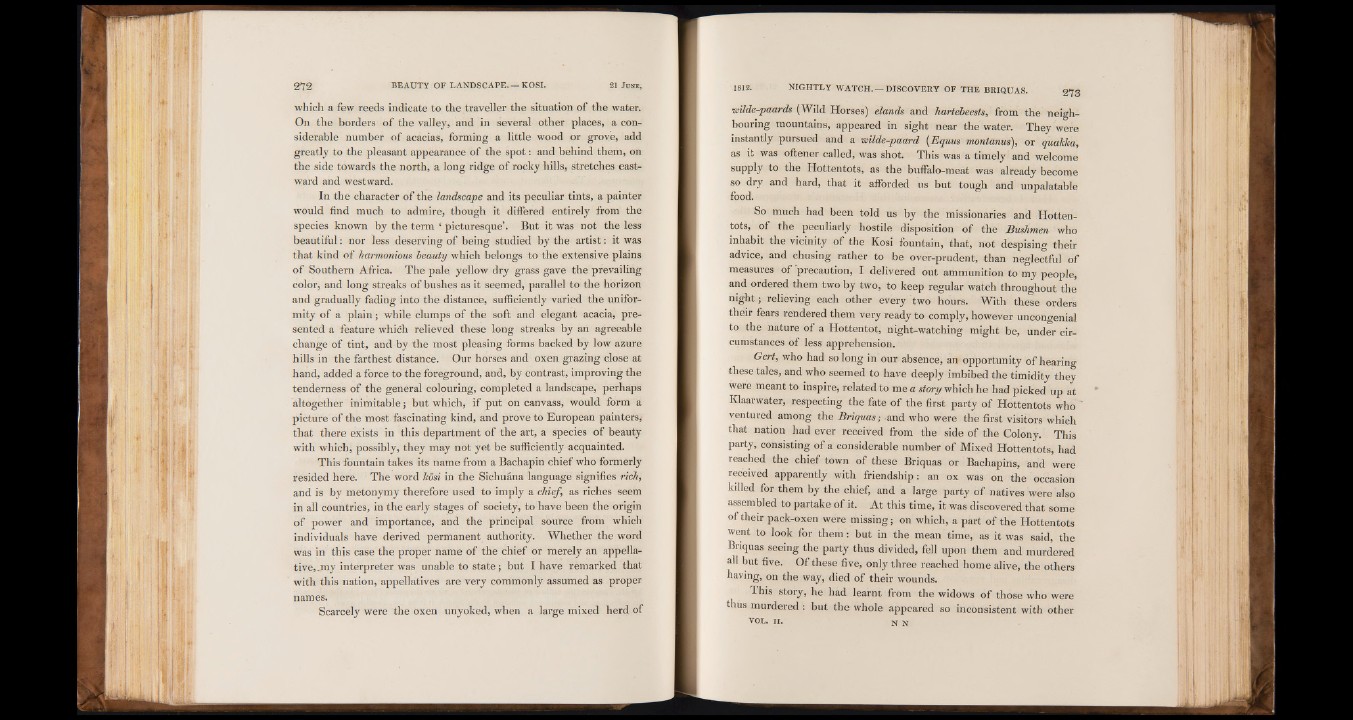
which a few reeds indicate to the traveller the situation of the water.
On the borders of the valley, and in several other places, a considerable
number of acacias, forming a little wood or groye, add
greatly to the pleasant appearance of the spot: and behind them, on
the side towards the north, a long ridge of rocky hills, stretches eastward
and westward.
In the character of the landscape and its peculiar tints, a painter
would find much to admire, though it differed entirely from the
species known by the term ‘ picturesque’. But it was not the less
beautiful: nor less deserving of being studied by the artist: it was
that kind of harmonious beauty which belongs to the extensive plains
of Southern Africa. The pale, yellow dry grass gave the prevailing
color, and long streaks of bushes as it seemed, parallel to the horizon
and gradually fading into the distance, sufficiently varied the uniformity
of a plain; while clumps of the soft and elegant acacia, presented
a feature which relieved these long streaks by an agreeable
change of tint, and by the most pleasing forms backed by low azure
hills in the farthest distance. Our horses and oxen grazing dose at
hand, added a force to the foreground, and, by contrast, improving the
tenderness of the general colouring, completed a landscape, perhaps
altogether inimitable; but which, if put on canvass, would form a
picture of the most fascinating kind, and prove to European painters,-
that there exists in this department of the art, a species of beauty
with which, possibly, they may not yet be sufficiently acquainted.
This fountain takes its name from a Bachapin chief who formerly
resided here. The word kósi in the Sichuána language signifies rich,
and is by metonymy therefore used to imply a chief, as riches seem
in all countries, in the early stages of society, to have been the origin
of power and importance, and the principal source from which
individuals have derived permanent authority. Whether the word
was in this case the proper name of the chief or merely an appellative,.
my interpreter was unable to state; but I have remarked that
with this nation, appellatives are very commonly assumed as proper
names.
Scarcely were the oxen unyoked, when a large mixed herd of
wilde-paards (Wild Horses) elands and hartebeests, from the neighbouring
mountains, appeared in sight near the water. They were
instantly pursued and a wilde-paard (Equus montanus), or quakka,
as it was oftener called, was shot. This was a timely and welcome
supply to the Hottentots, as the buffalo-meat was already become
so dry and hard, that it afforded us but tough and unpalatable
food.
So much had been told us by the missionaries and Hottentots,
of the peculiarly hostile disposition of the Bushmen who
inhabit the vicinity of the Kosi fountain, that, not despising their
advice, and chusing rather to be over-prudent, than neglectful of
measures of precaution, I delivered out ammunition to my people,
and ordered them two by two, to keep regular watch throughout the
night; relieving each other every two hours. With these orders
their fears rendered them very ready to comply, however uncongenial
to the nature of a Hottentot, night-watching might be, under circumstances
of less apprehension.
Gert, who had so long in our absence, an opportunity of hearing
these tales, and who seemed to have deeply imbibed the timidity they
were meant to inspire, related to me a story which he had picked up at
Klaarwater, respecting the fate of the first party of Hottentots who '
ventured among the Briquas; and who were the first visitors which
that nation had ever received from the side of the Colony. This
party, consisting of a considerable number of Mixed Hottentots, had
reached the chief town of these Briquas or Bachapins, and were
received apparently with friendship: an ox was on the occasion
killed for them by the chief, and a large party of natives were also
assembled to partake of it. At this time, it was discovered that some
of their pack-oxen were missing; on which, a part of the Hottentots
went to look for them: but in the mean time, as it was said, the
Briquas seeing the party thus divided, fell upon them and murdered
all but five. Of these five, only three reached home alive, the others
having, on the way, died of their wounds.
This story, he had learnt from the widows of those who were
thus murdered: but the whole appeared so inconsistent with other
v o l. n. n N